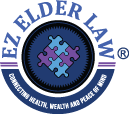
Federal law protects the healthy (or healthier) spouse of a nursing home resident. The healthier spouse is known in Medicaidland as the Community Spouse. The protections, known as the Spousal Impoverishment Rule (but logically be called the anti-impoverishment rule) were passed as part of the Medicare Catastrophic Coverage Act of 1988, P.ub. L. No. 100-360 […]






